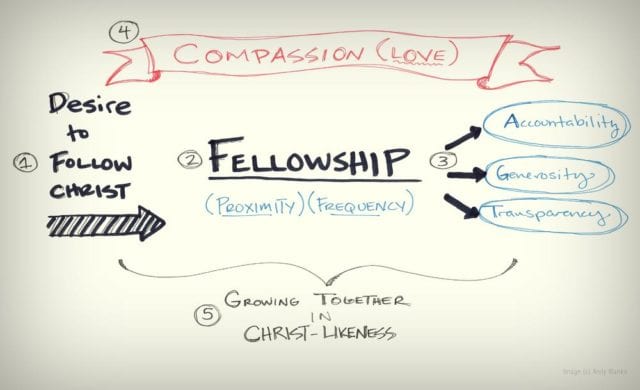Scripture attests over and over again that the Christian life isn’t meant to be lived or cultivated in solitude. In fact, “incubator for discipleship” is the biblical community definition.
I’ve been revisiting a working biblical community definition I came up with a few years ago. I want to pass it along to help you evaluate the community you’re growing in your youth ministry. For me, one question is at the heart of it all:
How do we transform students from merely a bunch of disconnected people to a true, biblical community definition of church?
When I think of biblical community, I automatically turn to Acts 2:42-47 and Acts 4:32-35. These passages provide such a great view of the young Jerusalem Church. Through the example of these first believers, we see the amazing potential we have for developing real community.
I’ve developed a diagram that helps me think about a biblical community definition. Here’s the diagram followed by a short explanation:
Biblical Community Definition Starts With a Desire to Follow Christ
First and foremost, young people must have a desire and a commitment to actually grow as followers of Christ. As we think about community, this starts with a commitment to grow in knowledge of God, with spiritual growth coming from applying this knowledge.
- “They devoted themselves to the apostles’ teaching.” (Acts 2:42)
- “Every day they continued to meet together in the temple courts.” (Acts 2:46, implied teaching)
- “With great power the apostles continued to testify to the resurrection of the Lord Jesus.” (Acts 4:33)
Students’ desire to grow spiritually must be the starting point of growing biblical community. Without it, you’re just hanging out together. You’re no different from any other group of people that gather.
Ask yourself:
- How would you describe the level of desire your students have to follow Christ?
- What can you do to help grow this desire?
Biblical Community Definition Includes Fellowship
Fellowship, or hanging out and doing life, is what biblical community is all about. If you think about it, it’s kind of both the means and the ends. Fellowship is the heart of community.
- The believers were “devoted to fellowship.” (Acts 2:42)
- They met “every day.” (Acts 2:46)
From these passages in Acts, you get the idea that fellowship has two aspects: proximity (literally being together) and frequency (being together often). Fellowship can’t happen unless we’re hanging out, doing life together, and doing it frequently.
Ask yourself:
- Do your gatherings foster fellowship?
- Is it enough to just meet with students formally? Or do you need to find ways to meet informally outside of your programmed meeting times?
Biblical Community Definition Requires Transparency, Accountability & Generosity
Although community probably has other characteristics, I see three main ones: Transparency, Accountability and Generosity. Acts 2:44-45 says, “All the believers were together and had everything in common. Selling their possessions and goods, they gave to anyone as he had need.” Great transparency is involved here! The believers weren’t concerned about image. They didn’t hesitate to openly bring their needs to the group. Generosity is present here, as well. These believers put others’ needs above their own.
James 5:16 says, “Therefore confess your sins to each other and pray for each other so that you may be healed.” Accountability can’t be forced; instead, it grows out of community. I can overcome my sin nature and talk to you about my sins only if we are “one in heart and mind.” We need a track record of fellowship. I have to trust you, and you need to have my best interests in mind.
Ask yourself:
- Does your group value transparency and generosity?
- Your students may not have physical needs the group can meet, but they have other needs. Is your group a place where students can openly bring spiritual and emotional needs to their friends?
Biblical Community Definition Includes Compassion
Over all these things flies the banner of compassion. Transparency, accountability and generosity are all contrary to our human nature. The temptation is to sit in judgment of each other when we’re transparent, or as people are holding us accountable. Compassion must rule! I think the best expression of this is Galatians 6:2-3: “Carry each other’s burdens, and in this way you will fulfill the law of Christ. If anyone thinks he is something when he is nothing, he deceives himself.”
Without compassion, true transparency, accountability and generosity can’t exist. And ultimately, neither can fellowship.
Ask yourself:
- Do you foster an environment of compassion within the youth group?
- Are students sympathetic toward one another’s unique life situations?
Always remember: The goal of community is to grow together toward Christlikeness.
What did I miss? What would you add to the biblical community definition?
This article originally appeared here.



